This is the edition edition of my monthly column on Tamil television for Firstpost. First published here.
What if the Bahubali franchise was made for, with and by women?
Benevolent and just warrior queen Amarendrika would have been the hero. She would be so pious and devoted that Lord Shiva himself would protect her and give her leadership advice. Her daughter would be the re-incarnation of Lord Shiva and her husband would be good-for-nothing eye candy.
On the other hand, Palvaaldevi would be the embodiment of pure evil — cunning, merciless, power-hungry queen who is as skilled as Amarendrika herself. She would have poisoned her own father to reach the throne. She would have a seductress sister and a vile brother taking her orders.
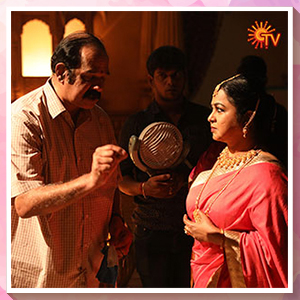
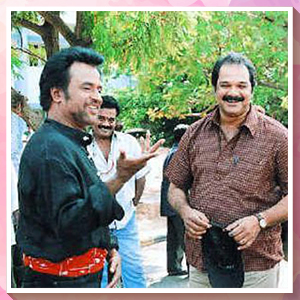
Well, we don’t even have to imagine this. This exists, today, on TV, for all of us to enjoy. Chandrakumari is a historical fiction mega-serial, jointly directed by CJ Bhaskar and our very own very-loved Suresh Krissna, the award-winning director of Sathya (1988), Annamalai (1992), and Baasha (1995) fame.
The involvement of Suresh Krissna, Sundar C and their like shouldn’t
be necessary to give credence to mega-serials; they should be enough on
their own. Yet, mega-serials get too much grief from today’s
film-devouring elite public — stereotypical, regressive, patriarchal,
bad production quality, bad actors, terrible makeup, the list is
endless.
But, feature-length mega-serials like Taramani (2017) are often hailed as the feminist intervention Tamil society needed.
Ennama ipdi panringale ma!
So today I present to you, six times when blood came for Tamil cinema, you called it thakkali chutney for mega serial!
Women, women everywhere, not a chance to whine.
Every year, when Oscar comes around, one other thing comes around without fail: Twitterati being surprised by the unfairly few speaking roles that women get in cinema! Where were you when Vijay kept speaking punch dialogues and Keerthi Suresh stood silently behind him? You can’t even tell if I’m talking about Bairavaa (2017) or Sarkar (2018), no?
Mega-serials, on the other hand, are made for middle-aged women under house arrest. It has nothing but speaking women! Remember in Agni Natchatiram (1988) Nirosha who whispered inanities into the horizon? You will be surprised to see how much she can speak, when given the opportunity!
Castles no more in the air, here women shine.
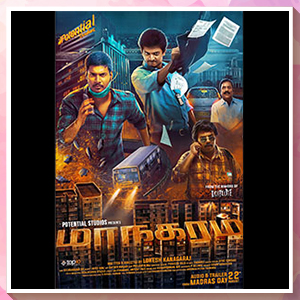
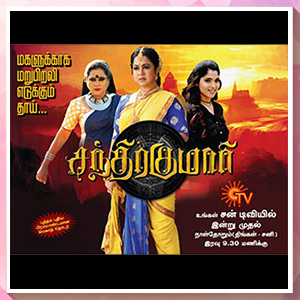
Castles no more in the air, here women shine.
The world of mega-serials is a world of women. Everything that happens in a mega-serial — good, bad, ugly or unbearable, is to and by women. So, for me, watching mega-serial is setting aside a few minutes every day to dwell in sisterhood. Well, I wouldn’t personally want to spend time with all/most of them — for their value systems are nearly as regressive as their cinematic brethren. But the idea that there is space for them at all is satisfactory.
Now don’t scream that women are merely acting. It would be naïve to think these shows are created, written or directed by women. But my point is, in the least, these serials are made keeping women in mind. At their worst, mega-serials feed into internalised misogyny. At their best, they are catering to the female gaze, long ignored by the overlords of cinema.
It’s still family, and I love them; so, I can only subvert.
A few days ago, there was a scene in Lakshmi Stores where the teenage daughter of the protagonist was kidnapped. The grandfather is a successful businessman, the father is an accomplished lawyer — he’s called “Tiger” Devaraj, no less, and there are three adult uncles in the joint family. These men were rather hopeless.
The kidnapped girl herself sent a written message into the world, fooling her kidnappers, which landed in the hands of her brother, because his friend — the second protagonist — had intuition and minimal detective skills. Every time there is trouble, often it’s the women who land in trouble, another woman shows up to save her. Serial after serial, women come to protect, support and uplift other women, family, friends and strangers alike.
As a natural consequence of it being a world of women, they also pull each other down. If all you can see is that women are women’s worst enemies, shall I blame your internalised patriarchy or the TV show?
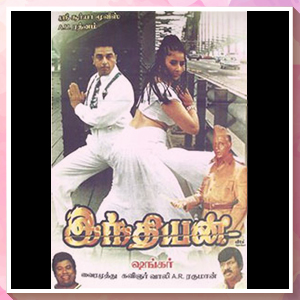
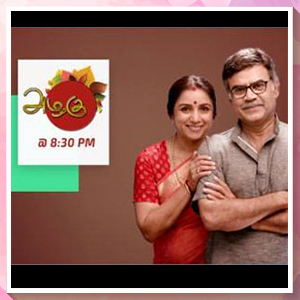
Ageism, sexism, and misogyny in your film; off with your head, you pervert!
Can you guess what the average age of a mega-serial protagonist is?
About 50. And most of them have sons/daughters of marriageable age. Unlike in Tamil cinema, where every story is a love story about a violent man, most mega-serials are about the emotional lives of middle-aged women.
It is an incredible bonus that the roles of middle-aged women are played by… yes, read it out loud… middle-aged women!
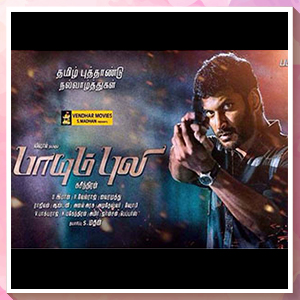
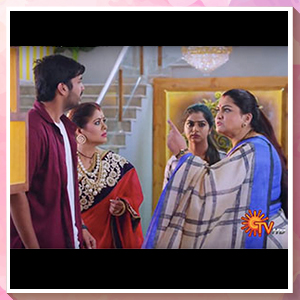
There was a long-running joke that mega-serials are the retirement homes of too-old-to-act-in-movies actresses. Well, if you’re laughing, the joke’s on you! By moving to mega-serials, these women have finally found a place where they are present and important.
I’m good and I’m evil, sometimes both together.
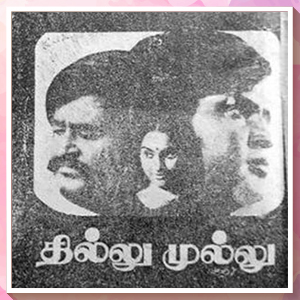
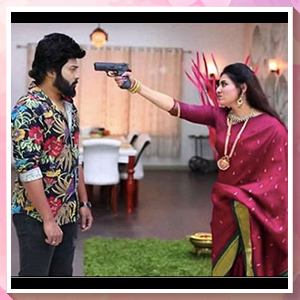
27 Dec 2017 (via Twitter/ZeeTamil)
Your average mega-serial villi is delightful. Devika Rani of Chandrakumari is a warrior-queen. Minister Shakuntala Devi of Lakshmi Stores is, well, an extravagant minister. ‘Aadhikadavur’ Akhilandeshwari of Sembaruthi is the matriarch who runs the business we’re told. She has a secretary who walks around the house wearing uniform and badge, mind you!
And then the mini-villis — they are the best. While the exaggerated nature of the art-form makes them appear like a crude caricature, I’d venture as far as calling them the post-modern representation of one’s evil inner-self: Just like the scantily-clad imaginary heroine of Soodhu Kavvum (2013). Anyway, nobody sees the ashtakonal faces these villis make, their evil might as well be invisible!
In fact, mega-serials do the opposite of stereotyping women as ‘sacrificial goddess’ and the ‘whoring devil’ — the complexities of women in these shows are rather interesting. An evil sister-in-law will soon reveal her desperately vulnerable side when she fears that her husband is disloyal to her. The rebellious daughter will turn a new leaf when she realises she can’t take on the world all alone. Sparring sisters will come together against a common enemy.
The foundational belief of the mega-serial is that when situations arise, women will rise up to the situation. And rise, they do!
Police station, court or jail, we’ve got this, brother.
Nearly every cop in the movies says something about women being forbidden in the police station. “Police station-ku oru ponnu varradhu ok-aa?”, (Is it ok for a woman to come to a police station?) asks AC Vetrimaaran in Kuttram 23 (2017). This is a film about women being murdered because they refused to give birth to the child of the villain, a child he illegally and immorally impregnated them with. Tamil cinema works very hard to keep women out of the ‘system’.
Mega-serials, on the other hand, are a fictional embodiment of “kaaval thurai ungal nanban”. (Police is your friend). For example, the only thing that doesn’t happen in Chandrakumari is the eponymous heroine throwing her hands around the Inspector’s shoulder and calling him machan!
If a serial heroine hasn’t gone to jail, she hasn’t yet arrived. Even after having served a jail sentence for murder herself, Chandra goes to the police at the drop of a hat. For financial fraud, daughter falling in love and all, Chandra walks up to the adversary in slow motion, Inspector always firmly by her side. If mega-serials are all you watched, you’d be convinced that you can approach the police!
In more ways than one, mega-serial is exactly the same as Tamil cinema — Patriarchy stinks up more than just films. Everything new and imaginative you see in films is there in the mega-serial: supernatural fiction, Hindu mythology, love songs, stalking, fight scenes, kidnapping, murder, melodrama, moralising and much more.
In many more ways, mega-serials are different, even admirable — they are the parallel universe women have sought for years and continue to seek. It is their stories and their lives, they have a character whose journey they can and want to follow. Come and critique the mega-serial, seriously, academically and thoughtfully.
But, chumma don’t watch a one-off episode half-heartedly, through the corner of your eye and dismiss a phenomenon that’s much loved and highly successful.
That’s all!
Leave a Reply